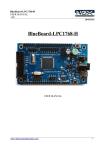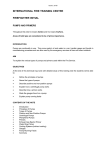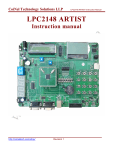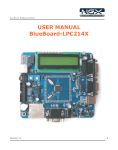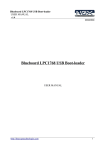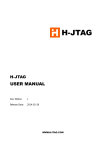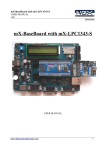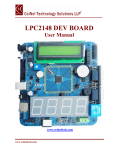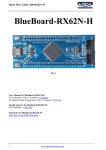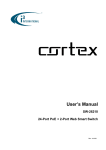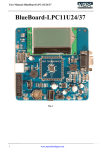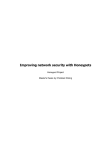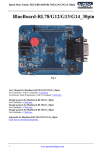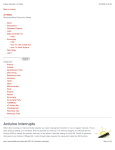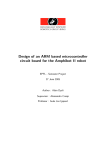Download Programming BlueBoard LPC1768-S
Transcript
BlueBoard LPC1768-S USER MANUAL v1.0 1/07/2010 BlueBoard LPC1768-S USER MANUAL http://shop.ngxtechnologies.com 1 BlueBoard LPC1768-S USER MANUAL v1.0 1/07/2010 Table of Contents Introduction..........................................................................................................................................3 Features.................................................................................................................................................3 Hardware.....................................................................................................................................3 Software......................................................................................................................................4 Getting Started......................................................................................................................................4 Requirement ....................................................................................................................................4 Hardware.....................................................................................................................................4 Software......................................................................................................................................4 Setup.....................................................................................................................................................4 Hardware.....................................................................................................................................4 Software......................................................................................................................................6 Validating BlueBoard LPC1768-S.......................................................................................................6 Programming BlueBoard LPC1768-S................................................................................................12 Programming BlueBoard Through ISP..........................................................................................12 1. Auto Mode:...........................................................................................................................12 2. Manual Mode:.......................................................................................................................12 Programming and Debugging with JTAG.....................................................................................13 Appendix............................................................................................................................................14 Functional Overview......................................................................................................................14 BlueBoard Base Utilities....................................................................................................................14 Schematics..........................................................................................................................................15 Sample Code.......................................................................................................................................15 Known Issues......................................................................................................................................16 Information.........................................................................................................................................17 Revision History......................................................................................................................17 Legal.........................................................................................................................................17 Disclaimers ..............................................................................................................................17 Trademarks ..............................................................................................................................17 http://shop.ngxtechnologies.com 2 BlueBoard LPC1768-S USER MANUAL v1.0 1/07/2010 Introduction The BlueBoard LPC1768-S is an add on board to the BlueBoardBase. The S signifies it as a stamp module. The BlueBoard Base can be used wih different microcontrollers to interface with various pheripheral connectors on it to facilitate the interfacing. Features The BlueBoard LPC1768-S is mounted on a board with connecting pins. Hardware • • • • • Dimensions of 47 X 47 mm2 Two layer PCB (FR-4 material) 32 Khz crystal for RTC 12 Mhz for Controller Test LED Software Preloaded firmware to test the peripherals on the BlueBoard Base. Getting Started Before starting you would need the following. Requirement The requirement is put in two sections. Hardware Refer to BlueBoard Base documentation here. Software Refer to BlueBoard Base documentation. Setup Hardware Mount the stamp board on to BlueBoard Base. Mounting has to be made with proper orientation. Note: Failure to mount the stamp in proper orientation on to the BlueBoard Base could render your stamp board and / the Base unusable and cause permannt damage. Kindly mount it as shown in the manual. http://shop.ngxtechnologies.com 3 BlueBoard LPC1768-S USER MANUAL v1.0 1/07/2010 The arrow (<) marked pin (P1) on stamp should go into the first pin on J1 on the base board. Refer to the images marked with a yellow circle. http://shop.ngxtechnologies.com 4 BlueBoard LPC1768-S USER MANUAL v1.0 1/07/2010 Software • • PC with WINDOWS XP Hyperterminal Validating BlueBoard LPC1768-S Once you have all these accessories connected to the BlueBoard Base you can run a simple test to verify the proper working of all the peripherals. It is highly recommended that you test all the peripherals as soon you receive the BlueBoard. The BlueBoard is shipped with the preloaded firmware which can test all the peripherals. LEDs and SPI0 Test setup: Connect jumpers to all pins of J9 to enable the LED's. After the Blueboard is turned ON or reset; the LEDs will turn ON and OFF a few times. Please note that all the LEDs should glow; this confirms the working of LEDs. Now, since the LEDs are connected through a serial to parallel converter this test also confirms the working of SPI0 of the LPC. Test LED on Stamp Test setup: The LED is on the stamp board. No seperate setup required. The LED will blink a few times on reset or power on. UART0 & UART3 Test setup: Connect jumpers to all pins of J6. Open the hyper terminal as shown in the image below. To test the UART you can use either a full modem or half modem cable. Click on hyper terminal a “Connection Description” window opens. Enter a name under the name tab e.g. BlueBoard and click OK. http://shop.ngxtechnologies.com 5 BlueBoard LPC1768-S USER MANUAL v1.0 1/07/2010 A “Connect To” window opens where you have to select the COM port. In this example it is COM1.Click OK. A “COM1Properties” window appears. Set the values as shown below.Click OK. Click OK. Next an empty “BlueBoard-Hyper Terminal” window opens as shown. http://shop.ngxtechnologies.com 6 BlueBoard LPC1768-S USER MANUAL v1.0 1/07/2010 Now make sure that the BlueBoard is powered and the serial port is connected to the respective port to be tested (UART0 or UART3). By pressing any key from keyboard the same will be echoed back on the terminal. For UART0: Loop back test can be done for UART 0. UART0 can also be used for serial programming. If the selected bootloader mode is Manual then Half modem cable should be used, else if it is in Auto mode use full modem cable. Note that after programming in auto mode the serial cable should be disconnected. For UART3: Loop back test can be done for UART 3 also. http://shop.ngxtechnologies.com 7 BlueBoard LPC1768-S USER MANUAL v1.0 1/07/2010 USB The USB connector can also be used to powerup the board. In Windows XP it will be detected as a Human Interface Device. Test setup: Connect the USB cable to USB connector. The power LED (D14) and USB connect LED (D10) turn ON. VGA connector – code presently not available Test setup: -- NA -JTAG connector Test setup: To enable debugging on the board connect jumper to J11 and connect the JTAG to debug port. We have successfully tested the BlueBoard with JTAG interface using a Wiggler Clone JTAG. To test this feature you need to have the necessary software support on your PC. Also the NGX USB JTAG can used with. Refer to the documentation here. User Interface Switch Test setup: The Switch SW1 is connected to one of the external interrupt lines of LPC. To test this interface simply press the switch and you should hear the beep sound on the buzzer. This confirms that both the interrupt line and the buzzer module are working fine. Please ensure that you have connected the buzzer jumper appropriately. Buzzer Test setup: Connect jumper to J23, when the board is turned on or RESET you will hear a few beeps. This is how the user can confirm the status of the Buzzer. SD/MMC connector Note: Do this test in the end as a new firmware has to be flashed and the previous test firmware will be overwritten. Test setup: To test the SD card a new firmware has to be loaded. This can be done using the Hhttp://shop.ngxtechnologies.com 8 BlueBoard LPC1768-S USER MANUAL v1.0 1/07/2010 JTAG. The firmware file can be found here. Insert a SD card in the SD card holder (J24). The board was tested with a Kingston’s 1GB SD card. Reset the board. A text file 'sdtest.txt' will be written on the SD card. Verify this using a card reader on PC / Laptop. Note: The SD/MMC card being tested should be formatted with FAT file system (Not FAT32 or NTFS format). Audio jack Test setup: Connect a headset to the audio jack connector. You should hear some random sound. The sound is heard only for few seconds after power ON or RESET. PS/2 keyboard – code presently not available Test setup: -- NA -- LCD display Test setup: To enable the LCD connect jumpers to all pins of J18. A default message “NGX TECHNOLOGIES” will be displayed and later status of SD/MMC and I2C is displayed. The back light of LCD can be controlled by connecting jumper to appropriate pins of J19. The contrast of LCD can be varied using the POT. RTC: A 2 - pin connector J27 is provided for RTC.Connect an external battery to use the to this connector to work with RTC. ADC: The ADC is connected to a potentiometer. To test the ADC turn the potentiometer, as the position varies the output number of LEDs that are turned ON varies. Programming BlueBoard LPC1768-S BlueBoard LPC1768-S can be programmed through wiggler clone JTAG or through serial port using ‘Flash Magic’. ‘Flash Magic’ is a freeware windows utility used download the hex file format onto the BlueBoard. Flash Magic can be downloaded from here http://www.flashmagictool.com/. If your PC does not have a serial port; use a USB to serial converter to download the hex file using the Flash Magic utility. For programming with JTAG your system should have a parallel port or you can use the USB to JTAG from NGX Technologies and the supporting IDE which can communicate to the processor core over JTAG interface. We have successfully tested BlueBoard with wiggler clone JTAG and USB JTAG with CrossWorks IDE. A LINUX utility to download the hex file can be found here http://www.pjrc.com/arm/lpc2k_pgm/. Programming BlueBoard Through ISP The BlueBoard Base can be programmed through ISP in two modes: 1. Auto Mode 2. Manual Mode http://shop.ngxtechnologies.com 9 BlueBoard LPC1768-S USER MANUAL v1.0 1/07/2010 1. Auto Mode: To program in Auto mode you need a full serial cable. Set the jumper to pins 2 & 3 of J26 and connect the full serial cable to UART0 (J5). When BlueBoard is powered ON black boxes will be displayed on LCD. Open Flash Magic tool, select the appropriate COM port, set the Baud rate to less than or equal to 38400 bps, select device as LPC1768, interface as 'None (ISP)' and oscillator frequency as 12MHz. Specify the path of your HEX file and click START. The status is shown at the bottom on the Flash Magic window. In the 'Step 4 - Options' check 'Verify after programming' and 'Fill unused flash' options. Checking the 'Set Code Read Prot' option will not allow you will program with JTAG. So keep it unchecked unless required. Note: 1. In Auto mode under the 'Options' tab select 'Advanced options'. In this under 'Hardware Config' tab make sure the options 'Use DTR and RTS to control RTS and P0.14' and 'Keep RTS asserted while COM port open' are checked. The values of T1 and T2 are set to 100ms and 200ms by default. 2. After programming the board in Auto mode you should disconnect the serial cable from J5. This is a known issue. 2. Manual Mode: To program in Manual mode you need a half serial cable (which just has TX, RX and GND wire connected). Set the jumper to pins 1 & 2 of J26 and connect the half serial cable to UART0 (J5) and power the board. To make the board enter programming mode • Hold down SW2 (ISP) and SW3 (RESET), then release SW3 first and finally SW2 • The controller enters the bootloader mode if during reset the SW2 pin is low Programming and Debugging with JTAG The Blueboard can be programmed and debugged either using parallel port or USB JTAG. • NGX Parallel Port JTAG using H-JTAG (refer here) • NGX USB JTAG (refer here) http://shop.ngxtechnologies.com 10 BlueBoard LPC1768-S USER MANUAL v1.0 1/07/2010 Appendix Functional Overview BlueBoard Base Utilities For the working with BlueBoard Base there are certain tools that need to be installed. The tools required are: Flash Magic Tool. The flash magic tool can be downloaded from the following link: http://www.flashmagictool.com/ H-JTAG http://www.hjtag.com/ For LINUX machines you may use http://www.pjrc.com/arm/lpc2k_pgm/ http://shop.ngxtechnologies.com 11 BlueBoard LPC1768-S USER MANUAL v1.0 1/07/2010 Tool chain: To be able to generate the hex or the binary file the user needs to install the tool chain for ARM based microcontrollers. Any toolchain can be used as long as it is able to generate the necessary files for downloading onto the BlueBoard. Here are few toolchain suggestions: GNUARM Toolchain: http://winarm.scienceprog.com/winarm-tools/prepare-gnuarm-compilertoolchain-for-windows.html Crossworks IDE: http://www.rowley.co.uk/arm/ IAR Systems: http://www.iar.com • • • • • • • • • • • • • • Analog to Digital Converter UART I2C E2PROM Driver - Reading and writing to an i2c-e2prom SPI - Using SPI in polled master mode to drive 8 x LEDs FIQ Handler VGA – code presently not available Timer Soft Timer - Demonstrates multiple timers with callbacks Watchdog SD/MMC access PS2 - Code to demonstrate PS2 keyboard – code presently not available Audio - Code to demonstrate wav playback Buzzer- Code to demonstrate buzzer on external interrupt Schematics Refer to the documentation here. Sample Code Download the zipped file here. http://shop.ngxtechnologies.com 12 BlueBoard LPC1768-S USER MANUAL v1.0 1/07/2010 Known Issues While using the Auto-program mode for ISP; after programming the BlueBoard Base, user needs to unplug the full modem serial cable for the program to execute. http://shop.ngxtechnologies.com 13 BlueBoard LPC1768-S USER MANUAL v1.0 1/07/2010 Information Revision History version: v1.0 author: Milind Kakati Legal NGX Technologies Pvt. Ltd. provides the enclosed product(s) under the following conditions: This evaluation board/kit is intended for use for ENGINEERING DEVELOPMENT, DEMONSTRATION, EDUCATION OR EVALUATION PURPOSES ONLY and is not considered by NGX Technologies Pvt. Ltd to be a finished end-product fit for general consumer use. Persons handling the product(s) must have electronics training and observe good engineering practice standards. As such, the goods being provided are not intended to be complete in terms of required design-, marketing-, and/or manufacturingrelated protective considerations, including product safety and environmental measures typically found in end products that incorporate such semiconductor components or circuit boards. This evaluation board/kit does not fall within the scope of the European Union directives regarding electromagnetic compatibility, restricted substances (RoHS), recycling (WEEE), FCC, CE or UL, and therefore may not meet the technical requirements of these directives or other related directives. The user assumes all responsibility and liability for proper and safe handling of the goods. Further, the user indemnifies NGX Technologies from all claims arising from the handling or use of the goods. Due to the open construction of the product, it is the user’s responsibility to take any and all appropriate precautions with regard to electrostatic discharge. EXCEPT TO THE EXTENT OF THE INDEMNITY SET FORTH ABOVE, NEITHER PARTY SHALL BE LIABLE TO THE OTHER FOR ANY INDIRECT, SPECIAL, INCIDENTAL, OR CONSEQUENTIAL DAMAGES. NGX Technologies currently deals with a variety of customers for products, and therefore our arrangement with the user is not exclusive. NGX Technologies assumes no liability for applications assistance, customer product design, software performance, or infringement of patents or services described herein. Please read the User’s Guide and, specifically, the Warnings and Restrictions notice in the User’s Guide prior to handling the product. This notice contains important safety information about temperatures and voltages. No license is granted under any patent right or other intellectual property right of NGX Technologies covering or relating to any machine, process, or combination in which such NGX Technologies products or services might be or are used. Disclaimers Information in this document is believed to be reliable and accurate. However, NGX Technologies does not give any representations or warranties, expressed or implied, as to the completeness or accuracy of such information and shall have no liability for the consequences of use of such information. NGX Technologies reserves the right to make changes to information published in this document, at any time and without notice, including without limitation specifications and product descriptions. This document replaces and supercedes all information supplied prior to the publication hereof. Trademarks All referenced trademarks, product names, brands and service names are the property of their respective owners. http://shop.ngxtechnologies.com 14















